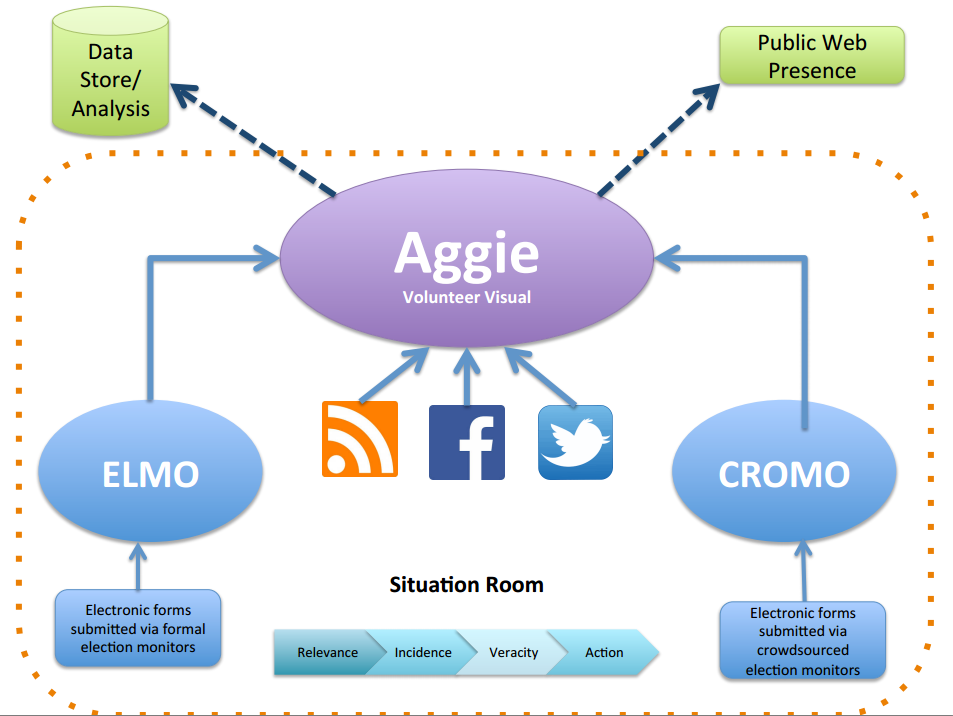| Dates: | Jan 2015 – Present |
| Skills/Subjects: | civic media, ethnography, information visualization, interaction design, mobile, open data, open government, research, UI design, usability, Usability testing, UX, web design |
| URL: | http://aggie.sassafras.coop/ |
Overview
The goal of eDemocracy, a Vertically-Integrated Project at Georgia Tech, is to use computing and communications technology to increase and improve the transparency and fairness of democratic processes and institutions at home and abroad. Democracies around the world are being transformed by the appearance of affordable, widely accessible technologies that promote democratic traditions like the meritocracy of ideas, grassroots organizations, distributed decision-making and adversarial debate. The eDemocracy team is focused on creating technologies that have real-world impact on processes like voting, resolving disputes and making laws, and on democratic institutions at all levels. Teams have the opportunity to do field work by observing elections in developing democracies, aiding governmental and non-governmental agencies, and providing information services to citizens. Current efforts will:
- Support democracy in developing regions of the world
- Increase public confidence in election results
- Enable citizens to become democratic decision-makers
- Increase transparency in evaluating democratic processes
- Foster democratic communities among regional and local electorates and among communities that span national boundaries
These objectives help develop research issues of:
- The capture, analysis and validation of large datasets from social media
- Innovative human-computer interface modes for low literacy settings
- Privacy, security and anonymity for trust-building
- Low-cost, rapidly deployable, resilient computer networks
- Evaluation of democracy enhancing technologies.
- Are people with an activist bent, and live in places where elections are not free and fair, more excited to participate in eDemocracy?
My advisors for this project were Ellen Zegura and Michael Best, and we have partnered with the Carter Center.
Usability testing
I led usability studies of our recently completed CROMO software, which manages submissions from crowdsourced election monitors. It is one of several components of our election monitoring ecosystem, depicted in the article’s main image. For CROMO, data purity and accuracy is highly important to achieve its primary goals of picking up where formally trained monitors leave off. It is difficult to formally train monitors, requiring funding for large-scale deployment, and official monitoring takes place only during elections, which is not always when voting fraud occurs. For example, there may be issues leading up to the election or after in counting ballots. The Carter Center formally trains volunteers on ELMO, but CROMO will require a more passive, distributive training method. We will be developing training material for download this semester, and I will test its reliability in training people to use CROMO compared to formal training. We’d also like to clarify whether a monitor would be trustworthy. At first, we will likely recruit Tech students or youth groups who usually have a better technical familiarity. Later we may try this out in St. Kitts’ elections in a few months. Nigeria is the next major location (about 60% use smart phones) for live testing during an election.
Machine learning
One of the most common issues in using Aggie is the volume of data it makes available is untenable for small teams to fully analyze. I suggest using machine learning to categorize reports in helpful ways for the human monitors to more easily filter and sort through reports. A few objectives I would like to work on eventually:
- create algo that categorizes (with confidence) data
- train algo on categories
- run new data on algo
- api to check confidence of category for content
- make api call for each new post and store
- show confidence of each category as sortable column on Aggie front end for each post
